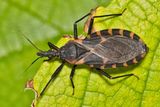Now Reading: Kissing Bugs Linked to Chagas Disease and Severe Heart Risks
-
01
Kissing Bugs Linked to Chagas Disease and Severe Heart Risks
Kissing Bugs Linked to Chagas Disease and Severe Heart Risks

Quick Summary
- Kissing Bugs and Chagas Disease: Kissing bugs, or triatomines, are vectors for Chagas disease in the Americas. The disease is caused by the parasite Trypanosoma cruzi, found in the feces of infected insects.
- How Infection Occurs: People get infected when kissing bug feces enter breaks in their skin or through mucosal contact during a bite. Other transmission methods include blood transfusions, organ transplants, pregnancy, and contaminated food.
- Impact on Pets: Household pets like dogs can contract Chagas disease by ingesting an infected bug or its feces; symptoms may include lethargy and heart issues.
- Symptoms: In humans:
– Acute phase symptoms: fever, fatigue, body aches, rash, vomiting; Romaña’s sign (swollen eyelid) may occur.
– Chronic phase (10-20 years post-infection): heart problems like irregular heartbeat or sudden cardiac arrest; gastrointestinal issues such as enlarged organs and severe stomach pain.
– Acute infections can be treated with antiparasitic medications but not during chronic phases where secondary complications arise.
- Prevalence in the U.S.: Over 300,000 Americans are estimated to have Chagas disease. California sees particularly high case numbers (70k-100k), especially Los Angeles County (~45k cases). CDC notes low awareness among medical professionals leading to underdiagnosis.
Indian Opinion Analysis
The identification of Chagas disease as endemic within certain regions of the United States highlights increasing global concerns around neglected tropical diseases crossing geographical boundaries due to environmental changes and human activity. India’s public health systems may take important lessons from this progress: robust surveillance infrastructure coudl be vital for combating similar vector-borne diseases within its borders.In India’s context-home to several tropical diseases-a parallel risk exists from vectors such as mosquitoes transmitting illnesses like dengue and malaria. Scaling up awareness about less-recognized threats ensures preparedness against emerging pathogens that might exploit similar transmission patterns seen with T. cruzi. Additionally, sustaining research into both human-centered treatments alongside localized veterinary measures gains importance considering how household pets here can also act as reservoirs for various diseases.
This news underscores a broader opportunity for global cooperation among nations including India to build expertise handling pathogens adapting across climates-enhancing detection systems while increasing treatment options before they reach irreversible chronic stages internationally.
Read more: Discover Magazine Article



























